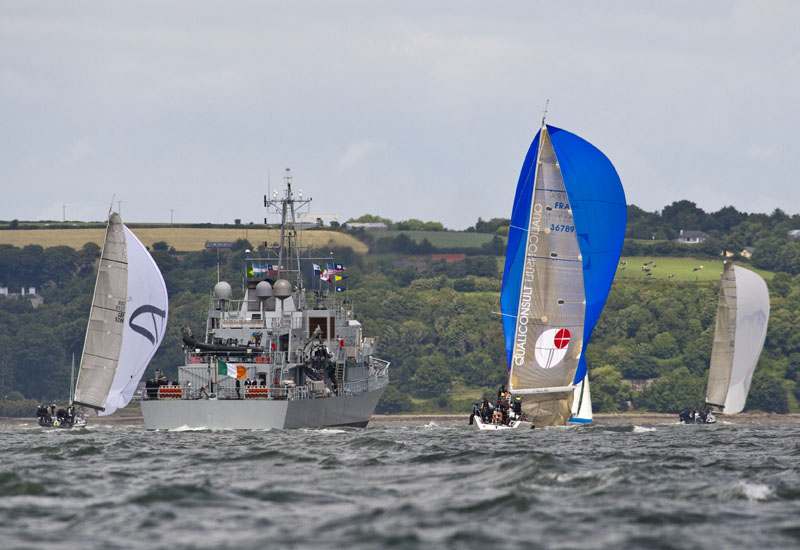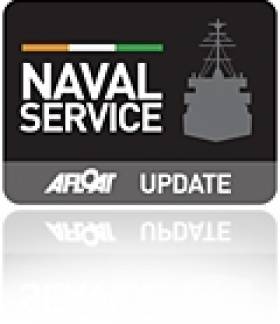Displaying items by tag: Mr. Brian Lenihan, TD
The Minister for Defence, Mr. Tony Killeen, TD, with his cabinet colleague the Minister for Finance, Mr. Brian Lenihan, TD, were today, at the Naval Service Base in Haulbowline, Cork to welcome home the Naval Service vessel the L.E. Niamh from her ten week mission to Latin America.
This deployment was in support of the strong cultural and heritage links between Ireland and South America, to mark the celebration of the bicentenaries of independence by Mexico, Argentina, and Chile, and to promote Ireland and Irish trade links in these countries.
The Captain of the LE Niamh is Lieutenant Commander Kenneth Minehane, a native of Bantry, Co. Cork, and there were 46 crew on the mission.

LE Niamh arrives back into Haulbowline today. Photo: Bob Bateman
Speaking on the LE Niamh in Cork Minister Killeen said "The trade and diplomatic mission to Latin America, which was undertaken by the LE Niamh, was a significant initiative from Ireland's perspective and is an example of the continued effective inter-departmental cooperation, particularly in the area of trade. The Captain and crew of the ship have carried out excellent work on behalf of the State in furthering our national interests in the region. I would like to commend them on their achievements and thank them for their service."
Minister Killeen continued "I am delighted to be able to announce today that following discussions with my cabinet colleague Mr. Brian Lenihan, T.D., Government approval has been received for the Department of Defence and the Naval Service to enter into discussions with UK based shipbuilder Babcock Marine, with a view to finalising negotiations for the purchase of two new Naval Service Offshore Patrol Vessels (OPVs).
The decision to proceed with the final award of the contract to purchase the OPV's is subject to these negotiations reaching a satisfactory outcome. I hope to be in a position to make a formal announcement regarding the award of the contract for the new OPV's by November 2010. However, as you can appreciate, as negotiations are ongoing it would be inappropriate for me to comment further on them at this time except to wish the officials in the Department of Defence and the Naval Service well in these negotiations".
Minister Lenihan said "I am also pleased to be here in Haulbowline this afternoon with Minister Killeen for this major announcement. I am especially pleased that in agreeing the Defence Estimates for 2011 it has been possible to provide for this key defence priority."
The older naval ships have a nominal lifespan of 30 years. By 2015, all but two of the current flotilla of eight Naval vessels will be at least 30 years old (which is the normal maximum lifespan of such vessels). The continued use of older vessels is expensive in terms of both maintenance and, more importantly, loss of days on patrol. Notwithstanding increased inspections, maintenance and repair, it is not recommended that any vessel should remain in service beyond 35 years.
The three oldest vessels, LE Emer commissioned in 1978, LE Aoife commissioned in 1979 and LE Aisling commissioned in 1980, remain in service through a programme of continuous planned and preventative maintenance and inspections. These inspections have recently resulted in extensive repairs being carried out to all three vessels with holes in the hull plating of each being detected and repaired in the course of dry docking. All three vessels were out of service for approximately 6 weeks.
Minister Killeen added "The acquisition of two new modern vessels will ensure that the Naval Service continues to be fully equipped to carry out its day to day roles in enforcing the State's sovereign rights over our waters and our fisheries and meeting Ireland's obligations in the area of maritime safety and security and fisheries protection. I am acutely aware of the difficulties for Irish fishermen arising from the damage inflicted by over fishing of some key stocks off our coast. The Naval Service plays a significant role in helping to return these stocks to sustainability."
























































